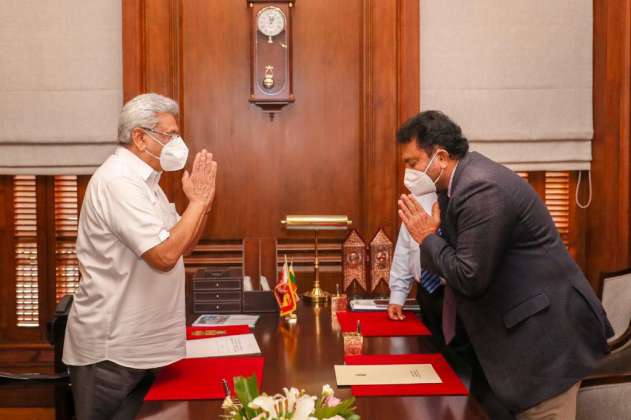
Former Sri Lankan Navy Commander, Wasantha Karannagoda who has been investigated as a suspect in the case of the disappearance of 11 victims, has been appointed as the new Governor of the North-Western province today.
Karannagoda served as Sri Lanka's Navy Commander from 2005 to 2009, during the armed conflict which saw the massacre of tens of thousands of Tamils. In 2019, Karannagoda was named as the 14th suspect in the case of the abduction and forced disappearance of 11 people, who were predominantly Tamil.
Earlier this year, Sri Lanka's Attorney General announced that it would not proceed with charges of torture, extortion, abduction and conspiracy to murder against Karannagoda. Reacting to the Attorney General's announcement, Yamini Mishra, Amnesty International’s Asia-Pacific Director, said:
“Sri Lanka has the world’s second highest number of enforced disappearances, with tens of thousands of people forcibly disappeared over many decades. This case was an opportunity for the Sri Lankan authorities to deliver justice for crimes under international law, by ensuring that those reasonably suspected of criminal responsibility, including those implicated for aiding and abetting and under command responsibility, are brought to trial."
All 11 victims were abducted in Colombo between August 25, 2008 and February 2009 and held for ransom at navy bases in Colombo and Trincomalee, before being presumably murdered.
The eleven victims have been named as Kasthuriarachchi John, Thyagarajah Jegan, Rajiv Naganathan, Soosaipillai Amalan, Soosaipillai Roshan, Kasthuriarachchi Anton, Prageeth Vishvanathan, Thilakeshwaran Ramalingam, Mohamed Dilan, Mohamed Saajid and Ali Anwar. Two fathers and their sons are among the victims and their ages range from 17 to 50 at the time of abduction.
In 2019, the International Truth and Justice Project’s (ITJP) report, ‘The Sri Lankan Navy: A Collective Blind Eye,’ highlighted the crimes committed by the Sri Lankan navy as well as a wider pattern of systemic torture that occurred over many years and in multiple sites, perpetrated by the Sri Lankan Navy and other units of the security forces.
The United Nations Human Rights Council (UNHRC) has tracked investigations and prosecutions relating to emblematic cases in Sri Lanka, including the abduction of the 11 youth. UN Human Rights high commissioner Michelle Bachelet, noted in a report earlier this year that "not a single emblematic case has been brought to a successful conclusion or conviction."
Karannagoda's appointment is the latest example of Sri Lanka rewarding perpetrators of mass atrocities and human rights abuses.
We need your support
Sri Lanka is one of the most dangerous places in the world to be a journalist. Tamil journalists are particularly at threat, with at least 41 media workers known to have been killed by the Sri Lankan state or its paramilitaries during and after the armed conflict.
Despite the risks, our team on the ground remain committed to providing detailed and accurate reporting of developments in the Tamil homeland, across the island and around the world, as well as providing expert analysis and insight from the Tamil point of view
We need your support in keeping our journalism going. Support our work today.
For more ways to donate visit https://donate.tamilguardian.com.

